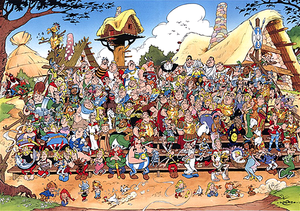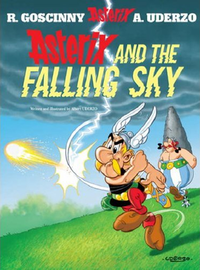Asterix
From Wikipedia, the free encyclopedia
| This article includes a list of references or external links, but its sources remain unclear because it lacks inline citations. Please improve this article by introducing more precise citations where appropriate. (November 2008) |
| Asterix | |
 Most characters of Asterix |
|
| Publication information | |
|---|---|
| Publisher | Dargaud (France) |
| First appearance | Pilote #1 (29 October 1959) |
| Created by | René Goscinny and Albert Uderzo |
| In-story information | |
| Alter ego | Astérix (French) |
| Team affiliations | The small Gaulish village. |
| Abilities | |
The Adventures of Asterix (French: Astérix or Astérix le Gaulois) is a series of French comic strips written by René Goscinny and illustrated by Albert Uderzo (Uderzo also took over the job of writing the series after the death of Goscinny in 1977). The series first appeared in French in the magazine Pilote on 29 October 1959. As of 2008, 33 comic books in the series have been released.
The series follows the exploits of a village of ancient Gauls as they resist Roman occupation. They do so by means of a magic potion, brewed by their druid, which gives the recipient superhuman strength. The protagonist, the titular character, Asterix, along with his friend Obelix have various adventures. In many cases, this leads them to travel to various countries around the world, though other books are set in and around their village.
The Asterix series is one of the most popular Franco-Belgian comics in the world, with the series being translated into over 100 languages, and it is popular in most European countries. Asterix is less well known in the United States and Japan.
The success of the series has led to the adaptation of several books into films; eight animated, and three with live actors. There have also been a number of games based on the characters, and a theme park near Paris, Parc Astérix, is themed around the series.
Contents |
[edit] History
Prior to creating the Asterix series, Goscinny and Uderzo had previously had success with their series Oumpah-pah, which was published in the Tintin magazine.
Astérix was originally serialised in the magazine Pilote, in the very first issue published on 29 October 1959.[1] In 1961 the first book was put together entitled Asterix the Gaul. From then on, books were released generally on a yearly basis.[2]
When Goscinny died, Uderzo continued the series alone, though on a less frequent basis. Although Uderzo declared he didn't want anyone to continue the series after his death, which is similar to the request Herge made regarding his The Adventures of Tintin, his attitude has now changed. This has provoked a family row. In a letter published in the french newspaper Le Monde, Uderzo's daughter, Sylvie, has attacked her father's decision for selling the family publishing firm and the rights to produce new Astérix adventures after his death. She is reported as saying the co-creator of Astérix, "France’s comic strip hero, has betrayed the Gaulish warrior to the modern-day Romans - the men of industry and finance”. [3][4]
[edit] List of titles
Here is a list of the main thirty three comics in the series.
Numbers 1 - 24 and 32 are by both Goscinny and Uderzo. Numbers 25 - 31 and 33 are solely the work of Uderzo. Years stated are for their initial release.
Asterix Conquers Rome is a comic book adaptation of the animated film The Twelve Tasks of Asterix. It was released in 1976 making it technically the 23rd Asterix volume to be published. But it has been rarely reprinted and is not considered to be canonical to the series. The only English translation ever to be published was in the Asterix Annual 1980.
[edit] Synopsis and characters
The main setting for the series is an unnamed coastal village in Armorica, a province of Gaul (modern France), in the year 50 BC. Julius Caesar has conquered nearly all of Gaul for the Roman Empire, however the little Armorican village has held out because the villagers can gain temporary superhuman strength by drinking a magic potion brewed by the local village druid, Getafix.
The main protagonist, and hero of the village, is Asterix, who is usually entrusted with the most important affairs of the village, because of his cunning. He is aided in his adventures by his rather unintelligent friend Obelix, who has permanent superhuman strength, as he fell into the cauldron of the potion as a baby. Obelix is often accompanied by Dogmatix, his little dog.
Asterix and Obelix (and sometimes other members of the village), go on various adventures both within the village, and in far away lands. Places visited in the series include parts of Gaul (Lutetia, Corsica etc), neighbouring nations (Belgium, Spain, Britain, Germany etc), and far away lands (North America, Middle East, India etc).
The series employs science-fiction and fantasy elements in the more recent books, for instance the use of extraterrestrials in Asterix and the Falling Sky and the city of Atlantis in Asterix and Obelix All at Sea.
[edit] Humour
Various forms of humour are made use of in the series. (citation needed)
[edit] Translations
The 33 main books or albums (one of which is a compendium of short stories) have been translated into more than 100 languages and dialects. Besides the original French, most albums are available in Estonian, English, Dutch, German, Danish, Icelandic, Norwegian, Swedish, Finnish, Spanish, Catalan, Basque, Portuguese (and Brazilian Portuguese), Italian, Hungarian, Polish, Romanian, modern Greek, Turkish, Slovenian, Bulgarian, Serbian and Croatian. Beyond modern Europe, some albums have also been translated into languages as diverse as Esperanto, Indonesian, Mandarin, Korean, Japanese, Bengali, Afrikaans, Arabic, Hindi, Hebrew, Frisian, Latin and Ancient Greek.
In France, in Finland, Poland and especially in Germany, several volumes were translated into a variety of regional languages and dialects, such as Alsatian, Breton and Chtimi (Picard) in France, Swabian and Low German in Germany, Kashubian[citation needed] and Silesian[citation needed] in Poland and Savo, Karelia, Rauma and Helsinki slang dialects in Finland. Also, in Portugal, a special edition of the first volume, Asterix the Gaul, was translated into local language Mirandese.
In the Netherlands several volumes were translated into Friesian, a language related to Dutch spoken in the province of Friesland. Also in the Netherlands two volumes were translated into Limburgish, a regional language spoken not only in Dutch Limburg but also in Belgian Limburg and North Rhine-Westphalia, Germany. Hungarian-language books have been issued in Yugoslavia for the Hungarian minority living in Serbia. Although not a fully autonomic dialect, it slightly differs from the language of the books issued in Hungary. In Greece, a number of volumes have appeared in the Cretan Greek and Pontic Greek dialects and in Ancient Greek.[5]
[edit] English translation
The translation of the books into English has been done by Derek Hockridge and Anthea Bell.
[edit] Adaptations
The series has been adapted into various media.
[edit] Films
Various motion pictures based upon the series have been made.
- Two Romans in Gaul, 1967, live-action, in which Asterix and Obelix appear in a cameo.
- Asterix the Gaul, 1967, animated, based on the book Asterix the Gaul.
- Asterix and the Golden Sickle, 1967, animated, based upon the comic book Asterix and the Golden Sickle, incomplete and never released.
- Asterix and Cleopatra, 1968, animated, based on the book Asterix and Cleopatra.
- The Twelve Tasks of Asterix, 1976, animated, a unique story not based on an existing comic.
- Asterix Versus Caesar, 1985, animated, based on both Asterix the Legionary and Asterix the Gladiator.
- Asterix in Britain, 1986, animated, based upon the book Asterix in Britain.
- Asterix and the Big Fight, 1989, animated, based on both Asterix and the Big Fight and Asterix and the Soothsayer.
- Asterix Conquers America, 1994, animated, loosely based upon the comic Asterix and the Great Crossing.
- Asterix and Obelix take on Caesar, 1999, live-action, based primarily upon Asterix the Gaul, Asterix and the Soothsayer, Asterix and the Goths, Asterix the Legionary, and Asterix the Gladiator.
- Asterix and Obelix: Mission Cleopatra, 2002, live-action, based upon the comic book Asterix and Cleopatra.
- Asterix and the Vikings, 2006, animated, based upon the comic book Asterix and the Normans.
- Asterix and Obelix at the Olympic Games, 2008, live-action, based upon the comic book Asterix at the Olympic Games.
[edit] Parc Astérix
Parc Asterix, a theme park based upon the series, was opened near Paris in 1989.
[edit] Influence in popular culture
- The first French satellite, which was launched in 1965, was named Astérix-1 in honour of Asterix. Asteroid 29401 Asterix was also named in honor of the character.
- During the campaign for Paris to host the 1992 Summer Olympics Asterix appeared in many posters over the Eiffel Tower.
- The French company Belin introduced a series of "Asterix" potato chips shaped in the forms of Roman shields, gourds, wild boar, and bones.
- Asterix and Obelix appeared on the cover of Time Magazine for a special edition about France.
- The animated series Disney's Adventures of the Gummi Bears also concerns an oppressed group in possession of a magic potion capable of conferring superhuman strength and agility.
- The 2006 FIFA World Cup final between France and Italy was depicted as a fight between Roman legions and Gaulish villagers in newspapers.
- Version 4.0 of the operating system OpenBSD features a parody of an Asterix story.[6]
- Action Comics Number 579, published by DC Comics in 1986, Written by Lofficier and Illustrated by Keith Giffen featured a homage to Asterix where Superman and Jimmy Olsen are drawn back in time to a small village of indomitable Gauls.
- Lisa Simpson is delighted at the sight of a rack with Tintin and Asterix comics in a comic book store, depicted in The Simpsons episode Husbands and Knives.
- Obelix made an appearance as one of several imaginary characters in the South Park episode Imaginationland III. (Picture 51 on page: http://www.spscriptorium.com/Season11/ImaginationlandGuests.html)
- Obelix is referenced in The King Blues' 2008 single My Boulder. The song features the lyrics, "If I'm Obelix, You are my boulder".
[edit] See also
- List of Asterix volumes
- List of Asterix games
- English translations of Asterix
- Portal:Bande dessinée
- Roman Gaul, after Julius Caesar's conquest of 58–51 BC that consisted of five provinces.
[edit] References
- ^ BDoubliées. "Pilote année 1959" (in French). http://bdoubliees.com/journalpilote/series1/asterix.htm.
- ^ The Complete Guide To Asterix, Peter Kessler
- ^ Shirbon, Estelle (14 January 2009). "Asterix battles new Romans in publishing dispute". Reuters. http://www.reuters.com/article/entertainmentNews/idUSTRE50D46K20090114. Retrieved on 16 January 2009.
- ^ "Divisions emerge in Asterix camp". BBC News Online. 15 January 2009. http://news.bbc.co.uk/2/hi/entertainment/7831375.stm. Retrieved on 16 January 2009.
- ^ "List of Asterix comics published in Greece by Mamouth Comix" (in Greek). http://www.mamouthcomix.gr/asterix/index.html.
- ^ OpenBSD 4.0 homepage
[edit] Sources
- Astérix publications in Pilote BDoubliées (French)
- Astérix albums Bedetheque (French)
[edit] External links
| Wikimedia Commons has media related to: Astérix |
| Wikiquote has a collection of quotations related to: Asterix |
- Official site
- Asterix Wikia
- Asterix around the World – The many languages
- Asterix NZ– General Reference site for English speaking Fans
- Alea Jacta Est (Asterix for grown-ups) Each Asterix book is examined in detail
- Les allusions culturelles dans Astérix - Cultural allusions (French)
- The Asterix Annotations – album-by-album explanations of all the historical references and obscure in-jokes




